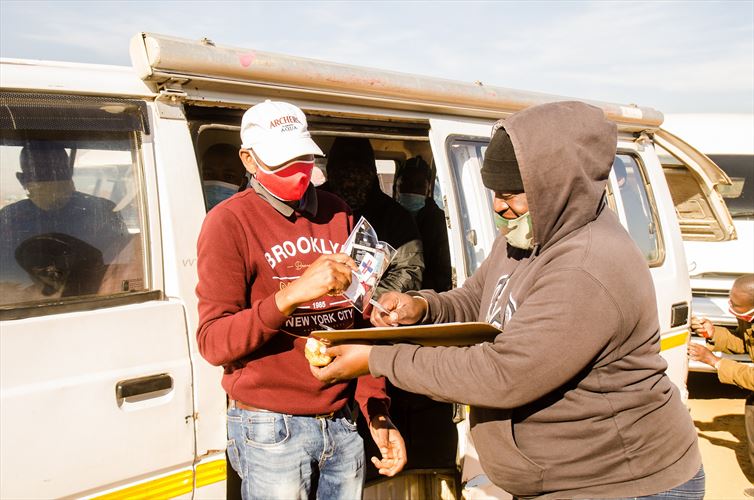Ford news

Ford Fund Provides Unjani Clinics with $20 000 Grant to Support Communities in Curbing the Spread of COVID-19
- Local non-profit company Unjani Clinics has received a $20 000 (R355 000) grant from Ford Motor Company Fund to assist their ‘Adopt a Taxi Rank’ initiative
- This project aims to mobilise hygiene amongst minibus taxi commuters in Mamelodi, Pretoria, and Struandale in Port Elizabeth
- Over 6 500 basic protection and hygiene packs to be distributed over 30 days to limit the spread of COVID-19 as commuters return to work
Pretoria, South Africa, 12 June 2020 – Ford Motor Company Fund has awarded a grant of $20 000 (R355 000) to Unjani Clinics to mobilise hygiene efforts and equip communities with basic personal protective items as a proactive measure to help contain the spread of COVID-19.
Ford Fund, the philanthropic arm of Ford Motor Company, has made specific COVID-19 Relief Program funding available to non-profit organisations (NPOs) around the world to support their efforts in limiting the spread of the virus and assisting vulnerable communities.
Unjani Clinics, which is a non-profit company and registered public benefit organisation, developed the project to focus on two main taxi ranks in Mamelodi in Pretoria and Struandale in Port Elizabeth respectively, where 6 500 protection and hygiene packs will be distributed to commuters over 30 days to limit the spread of COVID-19 as people begin returning to work.
“Our ‘Adopt a Taxi Rank’ project is in response to the COVID-19 pandemic that has rocked the world in recent months,” says Lynda Toussaint, CEO of Unjani Clinics. “We truly appreciate receiving the grant from Ford Motor Company Fund which allows us to mobilise this health and hygiene initiative at the main taxi ranks that are close to Ford’s plants in Pretoria and Port Elizabeth.
“We specifically selected low-income communities where people need to make use of public transport, but may not be able to afford proper protection against the coronavirus,” she adds. “If we can help protect commuters and get them safely to and from work, we will go a long way to limiting the spread and educating commuters on crucial hygiene issues in these high-risk areas.”
Under the current Alert Level 4 regulations, the wearing of face masks that cover the nose and mouth is mandatory when in public. The washable cloth mask included in the pack will help protect commuters in minibus taxis and other forms of public transport where close contact cannot be avoided.
While the regular washing of hands is recommended to prevent the spread of COVID-19, as well as in the interests of good general hygiene, in several low-income communities there is little or no running water, so hand hygiene and washing is not always possible. Accordingly, Unjani Clinics has provided hand sanitizer which can be used without water, along with individually wrapped sanitary wipes as an effective solution.
Included in each pack is also an educational flyer with key information on how to use the items provided, correct hygiene procedures to be followed, as well as guidelines on social distancing and COVID-19 symptoms and procedures.
The organisation has sourced two casual workers from each of the respective local communities to distribute the packs at the taxi ranks, and they have been educated in basic hygiene and social distancing. These workers will distribute approximately 130 packs per day at the Mamelodi taxi rank, and 80 per day in Struandale.
“Unjani Clinics joins the growing list of exceptional humanitarian organisations and volunteers that are responding to critical needs in society during this global health crisis,” says Neale Hill, managing director of Ford Motor Company of Southern Africa (FMCSA). “We value this initiative to support local communities by providing face masks and hand sanitizers, which many people simply cannot afford.
“It is also commendable that they are empowering casual workers to assist their very own communities in the distribution of the protective gear, as well as helping educate people regarding personal hygiene and ways of effectively preventing the spread of the virus,” Hill adds.
“Unjani” means “How are you?” in both Zulu and Xhosa. Accordingly, the organisation has a network of 74 clinics around South Africa that focus on the holistic health and wellbeing of its patients. They are primarily the unemployed or low-income uninsured population of South Africa (approximately 10 million people) who require a more affordable alternative to private medical aid while alleviating pressures on government facilities. Since its inception in 2014, Unjani Clinics has recorded in excess of 1.2 million patient engagements, and has created more than 250 permanent jobs.
It is also an enterprise development initiative aimed at empowering black women professional nurses, creating permanent jobs and perfecting a sustainable clinic model for providing primary health care.
Original article and image as supplied by QuickPic











